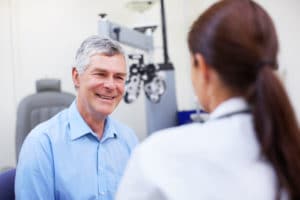Aging eyes and senior eye care
- Posted on: Dec 15 2019

- The need for more light. Reading and performing other tasks may require more light for you to see clearly.
- Noticeable glare. The lens of the eye can change in ways that result in the development of glare and can impact clear vision.
- Shifting in colors. Patients who notice changes in the way they see specific shades of color may want to undergo an evaluation to check their natural lenses for discoloration.
- Dry eye. Reduce tear production from the natural tear glands and ducts can cause the eyes to become dry. This condition can often be improved with the use of artificial tears as needed to keep the eyes moist and comfortable.
In addition to these changes, patients may also experience the development of more serious eye concerns. Conditions that often occur due to aging include:
- Cataracts. Blurry vision may be a sign of cataracts that are present in the eyes. Cataracts can be improved with surgery and other medical interventions, and often impact more than half of Americans over the age of 65.
- Glaucoma. Fluid pressure built up in the eye may cause the development of glaucoma. Permanent blindness can occur with this condition if left untreated. Patients with coexisting conditions such as diabetes may also be at a higher risk of developing glaucoma.
- AMD. Age-related macular degeneration is a concern that impacts central vision and can cause distortion of straight lines and blurriness in one’s line of direct vision. Peripheral vision often remains intact, but patients with severe AMD may be considered legally blind from the condition.
- Ocular hypertension. Ocular hypertension is a result of higher-than-normal eye pressure and can be a symptom of glaucoma onset in the earliest stages.
Schedule a visit at Jacksonville Eye Center
Dr. Robert Schnipper of Jacksonville, FL is here to assist patients in the community with their eye care needs. If you are interested in scheduling an eye exam or need to speak to a doctor about a specific eye concern, call (904) 355-5555 today. The practice is located at 2001 College Street and can provide comprehensive eye care solutions for patients of all ages.
Posted in: Cataracts, Eye Exam, Macular Degeneration, Vision Disorders
